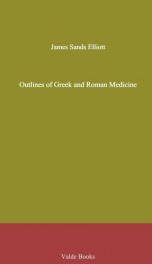Outlines of Greek and Roman Medicine

Purchase of this book includes free trial access to www.million-books.com where you can read more than a million books for free. This is an OCR edition with typos. Excerpt from book: 25 CHAPTER III. HIPPOCRATES. His life and worksHis influence on Medicine. Hippocrates, the Father of Medicine, was born at Cos during the golden age of Greece, 460 years before Christ. He belonged to the family of the Ascle- piadæ, and, according to tradition, could trace his ancestors on the male side to à sculapius, and on the female side to Hercules. He is said to have received his medical education from his father and from Herodicus, and to have been taught philosophy by Gorgias, the Sophist, and by Democritus, whom he afterwards cured of mental derangement. There was a very famous medical school at Cos, and the temple there held the notes of the accumulated experience of his predecessors, but Hippocrates visited also, for the purpose of study, various towns of Greece, and particularly Athens. He was a keen observer, and took careful notes of his observations. His reputation was such that his works are quoted by Plato and by Aristotle, and there are references to him by Arabic writers. His descendants published their own writings under his name, and there were also many forgeries, so that it is impossible to know exactly how many ofthe works attributed to him are authentic; but by a consensus of opinion the following books are considered genuine : " Prognostics," seven of the books of " Aphorisms," " On Airs, Waters and Places," " On Regimen in Acute Diseases," the first and third books of " Epidemics," " On the Articulations," " On Fractures," the treatise on " Instruments of Reduction," and " The Oath " ; and the books considered almost certainly genuine are those dealing with " Ancient Medicine," "Surgery," "The Law," "Fistulæ," "Ulcers," "Hemorrhoids," and "On the Sacred Disease" (Epilepsy). The famous Hippocratic Collection in the great libraries of Alexandr... --This text refers to an alternate Paperback edition.
Info about the book
Author:
Series:
Unknown
ASIN:
B0046A7PTO
Rating:
3/5 (4)Your rating:
0/5
Languge:
English
Users who have this book
Users who want this book
What readers are saying
What do you think? Write your own comment on this book!
write a commentGenre
if you like Outlines of Greek and Roman Medicine try:
Other books by this author
Do you want to exchange books? It’s EASY!
Get registered and find other users who want to give their favourite books to good hands!

